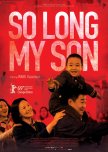
This review may contain spoilers
that life can be meaningful if we’re brave enough to let ourselves be vulnerable.
How do you cope with the loss of a family member? How do you tear down the walls you’ve put up to protect yourself from the outside world without crumbling under the weight of all the pain? And how do you ultimately learn to open up to the world again, and to form new connections and be vulnerable, with the awareness that, one day, they might leave too? Screened in competition at the 2021 Torino Film Festival, Aloners (Hon-ja-sa-neun Sa-ram-deul) deals with these and many more themes, from the struggles to process grief to the ghosts of the past that still weigh on our shoulders; from all the repressed anger that comes from a lifetime of buried emotions to the need to set boundaries with toxic family members; from how difficult it is to reach out and ask for help to the universal truths we keep hidden, such as the fact that life is often devoid of meaning and that we don’t really enjoy being alone all that much. Aloners is filmmaker Hong Sung-eun‘s (also the film’s writer and editor) feature directorial debut, but you absolutely wouldn’t think it was, judging by the complexity of its themes and by the sensitivity of a screenplay that effortlessly draws you in, crafting an atmosphere that is drenched in intrigue, mystery, emotion, and subtle irony.The film centres on Jina (Gong Seung-yeon, also in her feature debut), a woman in her late twenties who leads a repetitive (and highly relatable) existence: Jina works at a call centre, where she spends her time apologising to entitled clients who are often in the wrong, ignoring their insults, and accommodating their absurd requests. On her way back to her apartment, she walks on her own, her eyes glued to her mobile phone. At home, she lives by herself, and avoids interactions with her neighbours. She eats her dinner on her bed while watching TV and falls asleep not long after that, only to wake up the following day and have the exact same experience over and over again. In fact, not only has Jina managed to survive such a monotonous lifestyle for so long, but she’s also become exceptionally good at it: she’s currently the top employee at her workplace, due to how many phone calls she manages to answer (and endure) each day. But there’s a reason why Jina is so successful at being alone: quite simply, she has lost all interest in having interactions with others, be it her neighbours, her coworkers, or even her own family. Instead, she has chosen a life of seclusion and embraced the fact that her existence has no meaning.
But Jina isn’t the only “aloner” in the film. Her father (Park Jung-hak, of The Land of the Waves) also lives on his own, due to Jina’s mother’s recent passing, which left him a widower. His way of coping with his wife’s death is the opposite of Jina’s: he spends his days attending religious functions and turning his daughter into a scapegoat, guilttripping her into keeping him company and unloading all his guilt onto her to avoid facing the fact that he wasn’t present enough in his wife’s life. Also alone are Jina’s neighbours, a mysterious young man (Kim Mo-Beom) who attempts in vain to have a conversation with her every morning until he dies in mysterious circumstances, and a new neighbour, Seonghun (Seo Hyun-Woo, of A Taxi Driver), who rents the former resident’s apartment after his passing, and who’s temporarily on his own because his girlfriend believes his new flat to be haunted.
And then there’s Sujin (played by newcomerJung Da-Eun), a new employee at the call center that Jina has been given the task to train, and who keeps trying to befriend our protagonist, having just moved to Seoul from Chuncheon, where all her friends are. Through all these figures, not only does director Hong Sung-eun alert us of just how many people are living alone nowadays – so much so that the Korean term holojok has been coined to describe the people in the country who “prefer to be left on their own,” but also presents us with a story with more than one protagonist, each with their own distinct lives and points of view, and each with their own truths to keep hidden.
And there are quite a lot of unexpected things happening in Aloners, some more puzzling than others. There are tensions at Jina’s workplace, even more so after the balance is altered by the arrival of Sujin, as the newcomer’s enthusiasm and curiosity clash with the disillusionment of seasoned call centre workers who stopped trying to find any meaning or enjoyment in their job a very long time ago. There’s a demanding boss (Kim Hannah, of Shang-Chi and the Legend of the Ten Rings) who can still relate to her employees, underneath it all, and there’s a neverchanging routine that is turned upside down the moment Sujin arrives, bearing gifts that will come to assume different connotations later in the film. But there’s a lot more than that. There are wills that don’t make sense, people who secretly spy on others but aren’t able to communicate without placing or receiving blame, and people who are trying their hardest to open up to others but don’t know how. And then there are things that might or might not be happening in places that may or may not be haunted, mentally ill time machine-builders who might actually be geniuses, and people who are gone but still very much present in the memory of others.
Even that description doesn’t do Aloners justice, as there is just so much condensed into the film’s 91 minutes screentime, and Hong Sung-eun’s assured direction and delicate writing ensures we are always shown, not told not just what happens in the film, but also what remains unsaid. Different viewers will get a different message out of the film, depending on their own experiences and mindsets as they go into the screening. There’s social commentary on modern life, as you might expect, but there are also moments of irony and mystery to keep you entertained, as well as fantastic performances by Gong Seung-yeon and Jung Da-Eun that will haunt you long after the credits roll. There’s the occasional twist you won’t see coming, and there’s a very well-crafted, complex father-daughter relationship that perfectly encompasses the kind of baggage that affects our every interaction with our family members. Aloners is a film about processing grief, learning to let someone go, and letting yourself feel, with the awareness that, once all the walls you’ve put up are broken and your defences are gone, there’s no going back.
Yet, to me, the film is first and foremost about the burden we all silently share as human beings, and the kinds of truths that often remain unsaid just because it would tarnish the facade we’ve spent all these years perfecting. We have become so accustomed to not having a reaction when someone hurts us, apologising when we should be insisting on being treated with respect, and defending ourselves when we should be apologising that we’ve forgotten how to be vulnerable, and how to accept ourselves for who we are. Most of all, we’ve forgotten that we’re all alone, underneath it all, and that every single one of us shares the same fears and uncertainties. By taking on a journey with Jina and the other “aloners,” the film ultimately shows us that honesty and acceptance are the answers, and that, if we are brave enough to share our baggage with the right people, we might be able to find this existence of ours a little more meaningful, after all.
Was this review helpful to you?
The sinopses may seem to be about something else
If you expect a thriller, this movie isn't about it. But I really enjoyed the movie. The atmosphere delivers well the feeling of the main character, that represents how many people may feel on a society. The acting is really good as well. This movie development is a bit slow for some, so take time and try to extract the message that it is giving. I'll rewatch it for sure. I think that the least you know, the best when watching this one, because you can let it take you where it wants to.I came across the trailer of tis movie because of a YouTube add and it made me curious about this Mubi film.
Was this review helpful to you?

The price of loneliness
Aloners is a film written and directed by Hong Sung Eun, the only full-length film she’s done thus far. Which is disappointing because I quite liked her take on the price of loneliness and would love to see what else she has to offer. This film followed a young woman unable to reach past her own defenses to connect with anyone around her, further pushing her deeper inside herself.Jin Ah works at a credit card call center where she has to daily deal with rude customers and a frustrated time traveler. She lives alone. Eats alone. Smokes alone. Rides the bus alone. At a job where the employees have been zombified by the mind-numbing monotony, she works alone. Her relentless routine is challenged when she’s ordered to train Su Jin, the bubbly new employee. Su Jin has moved from her hometown to work in the bigger city and has no friends or family, leaving her alone. The only family Jin Ah has is her estranged father who had abandoned their family and swindled her as well. Jin Ah’s equally reclusive neighbor is found a week after he died buried under a fallen wall of magazines in his apartment. Suddenly and achingly, Jin Ah is forced to face her solitary existence.
Gong Seung Yeon perfectly captured Jin Ah’s tightly wound personality walking through her life where every day was just the same. Jin Ah was a prisoner in a castle, surrounded by a crocodile infested moat, a prison she had created herself. Earphones ever present to ward off any potential human contact, her only companions were her phone and television. A new neighbor asked, “Do you make a habit of being pissed off all the time?” And that was the key to Jin Ah, she wasn’t just an introvert, she was a tight ball of repressed anger and pain. Each new hit cracked away at her immaculately structured defenses
Being alone is something everyone faces at one time or another, chronic loneliness is a silent destructive force and the pain of it was palpable with the characters in this film. Director Hong slowly and subtly showed varying viewpoints on how people deal with loss and grief and the importance of human connection to help heal those wounds. If you are a fan of slow, slice of life films this might be one to try.
1 Aug 2024
Was this review helpful to you?

This review may contain spoilers
Relatable Yet Insipid
The movie was rather relatable in how lonely the character's life was lived however, I will say it did not feel like the movie picked up until the last 15 minutes, when she makes the call with Jina it really felt like it was going to go somewhere in which the character finally allows herself a moment to breathe and the angst and tension with her dad will be released however the ending is rather lackluster, I understand the character and her mindset, in fact, I am quite literally her, however, the film was making this large buildup with her father and the girl she was training only for it to fall flat. Although, she resolves the conflict with Jina, the one with her father feels unresolved due to the fact she doesn't meet up with him nor is she able to have an actual conversation with him about how she feels about her mother's death (a major catalyst for her break through on the phone with her dad). The ending just feels unfinished and yet way too long at the same time.Was this review helpful to you?
La historia es super lenta y sientes que no pasa el tiempo, a pesar de no ser una película muy larga, la historia se hace interminable. También, viendo la película, e incluso después de terminarla, no entendí totalmente cuál es el mensaje o el fin de realizarla. Incluso pienso que el accidente que tiene el vecino es un elemento que han utilizado para intentar atraer a la audiencia, sin embargo, al igual que la historia, no tiene ningún sentido en la historia. Supuestamente su sentido es alterar a la protagonista, pero no creo que fue algo tan grave para ella como para afectarla o alterarla.
En el caso de la protagonista, la venden como una persona que prefiere estar sola y tranquila, sin embargo, la han retratado más como una persona apática que no sabe cómo tratar con las personas y la sociedad. Tú puedes preferir estar sola que en compañía pero eso no quita que sepas relacionarte con los demás.
La verdad es que cuando descubrí esta película, la sinopsis me llamó mucho la atención y tenía muchas ganas de verla, pero ha sido un fracaso y una desilusión total. Sin embargo, eso no quiere decir que no te pueda gustar, por lo tanto te animo si quieres darle una oportunidad.
Was this review helpful to you?



































